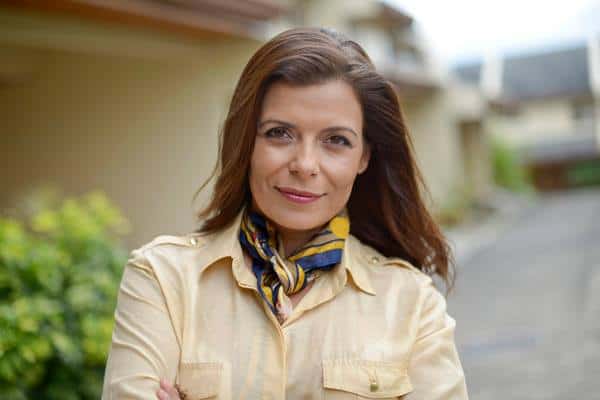Just months after Costa Rica’s leading daily La Nación fired one of its top investigative reporters, investigative editor and data journalism pioneer Giannina Segnini has resigned over a management dispute just days after the country’s presidential elections. She worked at La Nación for 20 years.
Segnini, 43, a 2001-2002 Harvard Nieman Fellow and winner of the prestigious García Márquez Award for Excellence in Journalism, helped bring the practice of data journalism – which relies on scientific analysis of data she and her team collect from public agencies – to Latin American newsrooms.
According to the International Consortium of Investigative Journalists, “Under Segnini’s leadership, La Nación’s investigative team has disclosed 10 cases of international corruption, including the Alcatel bribery scandal and a Finnish bribery case that sent two former Costa Rican presidents to jail.”
Those presidents are Rafael Ángel Calderón Fournier (1990-1994) and Miguel Ángel Rodríguez (1998-2002), both from the once powerful, and now-weakened, Social Christian Unity Party.
Rodríguez always has maintained his innocence, and the statute of limitations on the charges expired while the case was under appeal. Calderón’s case still is under appeal.
Segnini also obtained scores of WikiLeaks cables from open-information advocate Julian Assange, which were the source of several La Nación stories.
Her resignation adds to an ongoing controversy at the newspaper over its coverage of the recent presidential and legislative elections, and a decision by directors not to publish an election poll by the firm UNIMER.
In a statement to colleagues, Segnini cited the closing of spaces for independent journalism in recent weeks and years as one of the reasons she decided to leave:
“The spaces to conduct independent journalism – for which I’ve been grateful and of which I’ve taken advantage at La Nación for 20 years – have been consistently shrinking in the past two years, and especially in the past three weeks. A series of editorial decisions by this newspaper that were based on reasons I consider far from journalistic have made it impossible for me to continue working for this company.
“Due to the respect I have for my colleagues in the Investigative Unit, my journalism colleagues, and the many years I worked for La Nación, I will issue no further comments about the circumstances of my departure,” Segnini wrote.
Segnini is featured on the cover of January’s edition of Perfil, a variety magazine published by Grupo Nación. In that interview, Perfil asked Segnini if there are moments when a journalist should negotiate content that could affect business interests. Segnini responded:
“For me there is no such balance. Whatever I discover and can prove is what is published, whomever it may affect.”
Her latest project was a four-month data investigation that scrubbed the judicial records of 340 presidential and legislative candidates. On Jan. 19, Segnini’s team – which includes developers, designers, data experts, geographers and investigative journalists – produced a comprehensive interactive app, “#NoVotoACiegas,” that compiled the results of their investigation.
The app allows voters to check candidates’ backgrounds, and exposed the criminal records of at least nine legislative candidates. Some of the cases involved accusations of rape, embezzlement, fraud and bribery, among others. Two legislative candidates from the Libertarian Movement Party withdrew from the campaign following the reports.
Along with investigative reporter Ernesto Rivera, who was fired by La Nación last year and now works for the University of Costa Rica’s Semanario Universidad, Segnini published in 2005 stories involving former San José mayor and ruling party presidential candidate Johnny Araya and several municipal officials, who the stories linked to illicit payments for a landfill project with a Canadian firm. Araya has denied those allegations.
As a young reporter, Segnini also covered the Banco Anglo scandal, which in 1994 involved one of the country’s oldest banks. As a result of mismanagement by bank directors, Banco Anglo shut its doors after losing $100 million, a debt the government was forced to assume. Top bank officials went to jail, and 20 years later, debtors still owe much of that money.
Segnini often shared bylines with Rivera, who worked at La Nación for 12 years before he was fired last November. Rivera, who has received a special mention from Columbia University’s Maria Moors Cabot Awards, and who won the Inter American Press Society’s top journalism award, El País’ Ortega y Gasset award, and Transparency International’s Latin American Investigative Journalism Award (three times), said he was surprised by his dismissal.
On the same day Rivera was fired, La Nación also fired Carlos Villalobos, who served as the paper’s political editor for a decade.
Rivera’s last investigative series for La Nación, along with Segnini, included 18 tax evasion stories involving President Laura Chinchilla’s former finance minister, Fernando Herrero. Those stories prompted Herrero to resign, along with the director of the Tax Administration and Herrero’s wife, Flor Isabel Rodríguez, a former adviser to Chinchilla.
La Nación Corporate Director Armando González did not comment on Segnini’s resignation, referring questions to Grupo Nación spokeswoman Antonieta Chaverri. The Tico Times attempted to contact Chaverri by email and phone on Wednesday, but was unable to reach her by press time.









